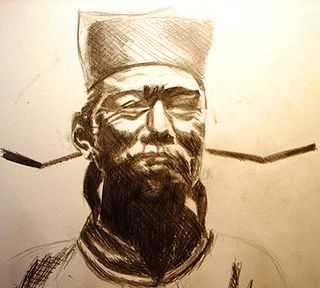See also
Topics referred to by the same term
This disambiguation page lists articles about people with the same name. If an internal link led you here, you may wish to change the link to point directly to the intended article.
John Xiphilinus or Xiphilinos may refer to:
Spanish might refer to:
Link or Links may refer to:

Year 1075 (MLXXV) was a common year starting on Thursday of the Julian calendar.
An epitome is a summary or miniature form, or an instance that represents a larger reality, also used as a synonym for embodiment. Epitomacy represents "to the degree of." An abridgment differs from an epitome in that an abridgment is made of selected quotations of a larger work; no new writing is composed, as opposed to the epitome, which is an original summation of a work, at least in part.
John Xiphilinus or Joannes Xiphilinos, epitomator of Dio Cassius, lived at Constantinople during the latter half of the 11th century AD. He was a monk and a member of the Xiphilinus family, a nephew of Patriarch John VIII of Constantinople, a well-known preacher.

Lucius Cassius Dio, also known as Dio Cassius, was a Roman historian and senator of maternal Greek origin. He published 80 volumes of the history of ancient Rome, beginning with the arrival of Aeneas in Italy. The volumes documented the subsequent founding of Rome, the formation of the Republic, and the creation of the Empire up until 229 AD, during the reign of Severus Alexander. Written in Ancient Greek over 22 years, Dio's work covers approximately 1,000 years of history.
St John's University may refer to:

John VIII of Constantinople, a native of Trebizond, was a Byzantine intellectual, jurist, and Ecumenical Patriarch of Constantinople from 1064 to 1075. He was the uncle of John Xiphilinus, the Epimator. He is considered "an innovator in the field of the methodology of jurisprudential research".

Gnaeus Minicius Faustinus Sextus Julius Severus was an accomplished Roman general of the 2nd century. He also held the office of suffect consul in the last three months of 127 with Lucius Aemilius Juncus as his colleague.
Example may refer to:
The Patrologia Graeca is an edited collection of writings by the Church Fathers and various secular writers, in the Greek language. It consists of 161 volumes produced in 1857–1866 by J.P. Migne's Imprimerie Catholique, Paris.
Xiphilinus was a Byzantine family name. The family was from Trebizond and was considered of lowly origin. In the 11th and 12th centuries members were found mainly in the church and the bureaucracy in Constantinople and Thessaloniki. They were intellectuals rather than soldiers. They declined in importance after the sack of Constantinople in 1204.
Monumenta Historica Britannica (MHB); or, Materials for the History of Britain, From the Earliest Period, is an incomplete work by Henry Petrie, the Keeper of the Records of the Tower of London, assisted by John Sharpe. Only the first volume covering material prior to the Norman Conquest was printed in 1848 by G. E. Eyre & W. Spottiswoode for Her Majesty.OCLC 4063392 It was reprinted by Gregg Publishing in March 1971 (ISBN 0576199958).

Galeria Fundana was a Roman empress and the second wife of Roman emperor Vitellius.
Constantine III of Constantinople was the Ecumenical Patriarch of Constantinople from 1059 until his death in 1063.
"Are You Ready for Love" is a song recorded by English musician Elton John in 1977 and first released in the UK in 1979 as the first single from the EP The Thom Bell Sessions. It was written by LeRoy Bell, Thom Bell and Casey James, and was originally produced in Philadelphia by Thom Bell, who had already produced a series of hits for the Spinners, the Delfonics and the Stylistics. While the song "Mama Can't Buy You Love" from the EP charted in 1979, this song and the other track on the three-track 12-inch vinyl disc, "Three Way Love Affair", were only minor footnotes at the time. The song originally peaked at number 42 on the UK Single Charts in 1979.
John Hennigan may refer to:
John F. Kennedy, a Democrat from Massachusetts, was elected President of the United States on November 8, 1960, was inaugurated as the nation's 35th president on January 20, 1961, and his presidency ended on November 22, 1963, upon his assassination and death. The following articles cover the timeline of Kennedy's presidency:
George II Xiphilinus was the Ecumenical Patriarch of Constantinople between 1191 and 1198. According to Theodore Balsamon, George II, during the reign of Emperor Alexios I Komnenos, added one member to the Exokatakoiloi, making it six.
SS John Mitchell may refer to the following ships: